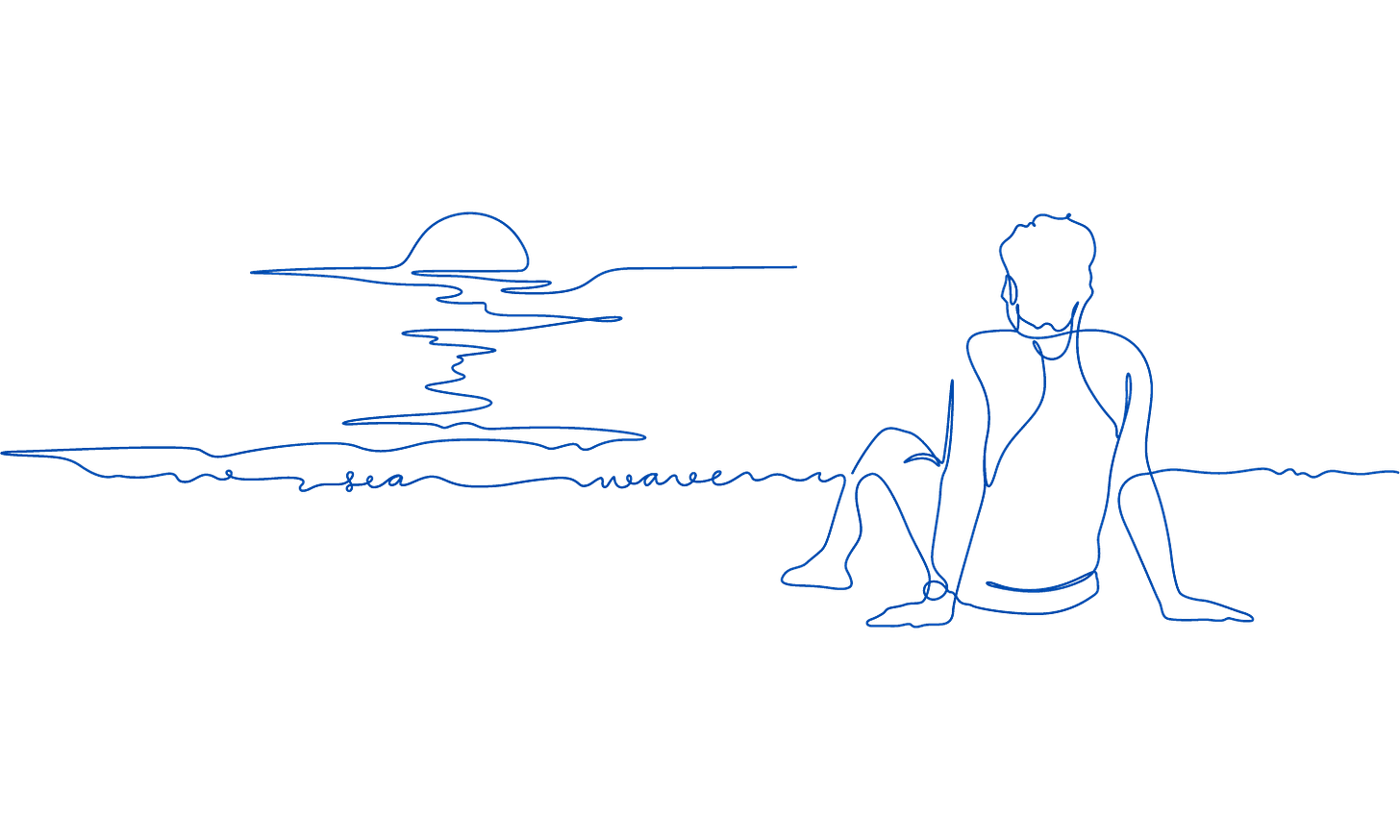Men Performing Masculinity, Convo #3
A conversation with the self featuring Mostly Water author John Lovie
Hello lovely reader! This is the final installment of the collaborative pieces featuring
, , and . I ask that you read these pieces through the lens discussed in the introduction piece Men Performing Masculinity and meet these wonderful men with empathy and grace. Thank you. 💜An introduction to John
[Provided by John]
John Lovie is and islander, water lover, writer, and a recovering award-winning serial non-profit volunteer. Born in England, he's also lived in Holland and on both coasts of the United States. He writes Mostly Water, a newsletter that, like the human body and the earth's surface, is mostly, but not entirely, water.
An introduction to John’s writing
[Provided (and read!) by John]
So, what's water got to do with masculinity or patriarchy? Quite a lot, as it turns out. Let me explain.
I write, as my newsletter title suggest, mostly about water, but perhaps more accurately about the world through the lens of water. Stories that start out being about water grow into stories about capitalism, land theft, racism, and colonialism. Access to water is used as a tool to consolidate power and control, as a weapon of war, and even as a tool of genocide, all driven by patriarchal ideology. The global rich are buying land to control the water rights that go with it. Meanwhile, 2.2 billion people worldwide lack access to safe water, and 3.5 billion lack access to a safe toilet. The burden of collecting water falls disproportionately on women and girls, who also risk assault through lack of safe toilets.
While access to safe water should be a basic human right, it's being slowly privatized for personal and corporate gain, so attempts to address what has become a water crisis become a threat to profits. As we'll see elsewhere, the patriarchy defends itself by spinning threats it faces as attacks on masculinity using the language of conflict and domination, speaking for example of the "war on lawns."
A conversation with the self:
If you could go back and speak to your 12 year old self (and he listened!), what guidance would you give him around becoming a man in a patriarchal society?
For historical context, my twelfth birthday was in 1963. Second-wave feminism was just dawning in the United States, and it would be years before the word patriarchy would acquire its modern meaning of the society-wide subjugation of women.
I went to an all-boys school in Portsmouth, England, with all-male teachers and a hierarchy maintained by corporal punishment and bullying. To paraphrase David Foster Wallace's This is Water, the conversation with my twelve-year-old self might have opened like this:
Me at seventy-two: "Hello, young man, how's the patriarchy?"
Me at twelve: "What the hell is patriarchy?"
Patriarchy was just the water we were swimming in, and masculinity was how we swam.
"You know how you feel offended by those stupid, arbitrary rules, having to wear a uniform, the bullying, the corporal punishment? How you're expected to call each other by your last names, because first names would be too friendly? How you feel that it's all just wrong?
"Well, your instincts are correct. It's all designed that way to keep certain people in control. But your life doesn't have to be that way. Try to spend time with friends outside school. It's OK to have girls as friends, too. Write a letter to the girl who moved to Canada. And the girl you built an igloo with, who once took you sailing? Talk to her and see if she'd like to hang out or go for a bike ride or a walk. It's also OK to spend time by yourself, just reading, building models, or riding your bike. Oh, and be nicer to your mom!"
Now, if you could go back and speak to your 30 year old self to guide him, what would you say?
My thirtieth birthday was in 1981. I was living in Holland and working for an American corporation. My first child was almost a year old and my marriage already a little shaky. I was struggling more than I knew or could let on. There was a deep cognitive dissonance between my values and the way I felt I had to live my life, but I didn't know that. I just figured there was something wrong with me. I'd become a serious environmentalist in college, but jobs in that field didn't exist when I graduated, so I had to take a corporate job. It was hard to reconcile my values with the pressure to be "successful", so I put my values on hold.
In Holland, I was in a country and an environment that was very supportive and progressive. I had a number of good role models among my friends and colleagues who managed to ride their bikes to work, be caring husbands and fathers, and still work the corporate job, but there was always a sense that they weren't going to be successful in their careers, and I couldn't shake the idea that I had to be. I couldn't see any way forward other than to keep trying to climb that ladder. The paradox is that even though my risk-averse spouse was the one who was suffering the most from my stress, that's where I felt the most pressure to provide, backed-up by my equally risk-averse parents. I'd also internalized much toxicity from my school days that I had yet to let go of. I'd moved countries to get away from it, but of course I'd brought it with me.
If I could go back, I'd tell my thirty-year-old self to make the other choice; to quit the job and change careers; to stop trying to cosplay the macho man; to do the laundry, cook, and clean; to start living in alignment with my values. No matter what the price, it would be less that the suffering I was feeling.
In a patriarchy, much of our behavior is driven for the need to be accepted by our peers/community/family, and as such we often behave contrary to how we internally feel. When was the last time that you felt enough when performing patriarchy?
I never felt enough performing patriarchy, but that just made me try harder. There was always that cognitive dissonance. I moved again at thirty-four, this time to New Jersey, still chasing that dream of corporate success. What I found was rampant patriarchy. The casual misogyny was stunning. The company ran an ad in a trade magazine featuring a salesman (of course) sitting in a diner doing paperwork while the cleaning lady (of course) looked at the clock reading five minutes to midnight. The caption read "Customer commitment means missing your wife's birthday," with other versions reading "... your wedding anniversary," or "... your kid's soccer game." .
I tried to cosplay it for six years, but after too many missed birthdays, anniversaries, and soccer games, I finally quit corporate life for good just before my fortieth birthday. By that time I'd convinced myself I was unworthy of love and unworthy as a husband and father, and my first marriage paid the price.
Has this changed as you’ve aged?
After leaving corporate life, I started working as a computer trainer. There, I was working mostly with women and mostly out of the grasp of patriarchy. I was able to form some deeper friendships with women. One such friend was going through some health issues which ultimately proved terminal. Over the months she had left, we became good friends. She told me, showed me, and most importantly, let me find out for myself that I was capable of unselfishly caring about someone, that I was worthy of the same, and that I was worthy of being a father. It was a turning point, the beginning of the long, slow process of living my life according to my values and unlearning the bad habits I'd acquired. Six years later I met my second wife. We celebrated twenty five years of marriage last month.
Our climate is in crisis. In what ways do you see patriarchy connecting to this from your observations?
Patriarchy and the climate crisis both have their roots in dominionism, whether it's men seeking dominion over women or mankind seeking dominion over nature. In both cases, the would-be dominator suffers as much as the dominated. Several other -isms—colonialism, capitalism, authoritarianism, racism and even individualism, the dominion of the individual—share the same roots, which can be traced back to the Greco-Roman traditions and the monotheistic religions, all of which are manifestations of hierarchy and power. There is no addressing one of these without addressing the others, which is why, I believe, there is so much hostility to efforts to address both patriarchy and climate change. Those in power feel threatened. They, in turn, prove the connection between the two through attacking proposed climate solutions by spinning them as a threat to masculinity.
Are you able to talk to other men about collective care of our Mother Earth?
All this means is that there's no easy way in with (most) men to that conversation. Collective is socialism, a dirty word, while care and Mother Earth are associated with the feminine, so the whole idea is interpreted as an affront to rugged individualism, a loss of freedom, and an attack on masculinity.
To engage men, we often have to start with a threat to something else that they care about, such as wealth or private property, and then talk in terms of "fighting" sea level rise or environmental destruction. But that's the language of dominionism, the very mindset that caused the problem.
What advice would you give to a reader of this on being a better man while also being a better climate activist?
Just as the patriarchy and the climate crisis have common roots, they have a common path forward for men. Being a better man in each case means letting go of the desire to dominate or control.
Seek an equal partnership with women, because we are equal, and with nature, because we're part of it.
Further Reading
Subscribe to John’s newsletter here: Mostly Water















Wow, John, the vulnerability in this is so beautiful. I’m really grateful to have been reading your writing for some time now, and to know your generous spirit online in this space. There are so many men I want to send this to (and the other posts in this series as well), and the heartbreaking thing is that I don’t know how most of them would receive it. But you putting your story and understanding out there helps probably more people find their way to doing the same.
And yes to the dominionism! I know we share a lot of thoughts on this. I was just yesterday thinking of Abdullah Ocallan’s book “The Sociology of Freedom” and how he traces all of this (especially reiterating oppression of women many times) back to serious power hoarding beginning 5,000 years ago.
Grateful for you.
John I throughly enjoyed deconstructing patriarchy and what is meant to you performing it particularly. It is so important to embrace with tenderness, like you did here, all the wounds accumulated being a misfit at playing typical gender roles. It is rare to see men from your generation to take ownership of the past and acknowledging the system that conditioned them. I am so grateful to have found you John. Thank you for choosing to share your story with us.